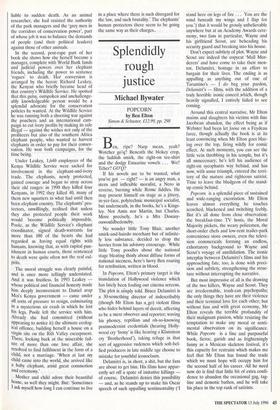Splendidly rough justice
Michael Bywater
POPCORN by Ben Elton
Simon & Schuster, £1 2.99, pp. 298
en, ripe? Narp mean, yeah? Wotcher go'q? Beneath the blokey crop, the laddish smirk, the right-on tee-shirt
and the dodgy Estuarine vowels Wo? Tcher? GO'Q?
If his novels are to be trusted, what you've got — right? — is an angry man, a stern and inflexible moralist, a Nero in reverse, burning while Rome fiddles. He may present himself on stage as a jittery, in-yer-face, polytechnic municipal socialist, but underneath, in the books, he's a Kings- ley. Not Amis nor Martin, but Charles. More precisely, he's a Mrs Douasy- ouwouldbedoneby.
No wonder little Tony Blair, another smirk-and-hairdo merchant but of infinite- ly less substance, decided to drop the luwies from his advisery entourage. While little Tony poodles about the national stage bleating thinly about diffuse forms of national niceness, here's luvvy Ben roaring for retribution, written in blood.
In Popcorn, Elton's primary target is the inundation of Hollywood violence which has lately been fouling our cinema screens. The plot is simply told. Bruce Delamitri is a 30-something director of indescribably (though Mr Elton has a-go) violent films who hides behind layers of deceit, affecting to be a mere observer and reporter; waving his phoney, reptilian and oh-so-knowing postmodernist credentials (hearing Holly- wood cry 'Irony' is like hearing a Klansman cry 'Brotherhood'), taking, refuge in that sort of aggressive rudeness which soft-bel- lied prOducers in late middle age choose to mistake for youthful iconoclasm.
Delamitri is, in short, a shit, but the fans are about to get him. His films have appar- ently set off a spate of imitative killings of course, Delamitri denies this possibility — and, as he stands up to make his Oscar speech of such appalling sentimentality CI stand here on legs of fire ... You are the wind beneath my wings and I flap for you.') that it would be grossly unbelievable anywhere but at an Academy Awards cere- mony, two fans in particular, Wayne and his girlfriend Scout, are beheading his security guard and breaking into his house.
Don't expect subtlety of plot. Wayne and Scout are indeed the copycat 'Mall Mur- derers' and have come to take their men- tor, Delamitri, hostage in an effort to bargain for their lives. The ending is as appalling as anything out of one of Tarantino's — I do beg your pardon,' Delamitri's — films, with the addition of a truly horrible ironic conceit .which, though heavily signalled, I entirely failed to see coming.
Around this central narrative, Mr Elton maims and slaughters his victims with fine Jacobean abandon, the effect being as if Webster had been let loose on a Feydeau farce, though aaually the book is at its least convincing when Mr Elton goes blaz- ing over the top, firing wildly for comic effect. At such moments, you can see the little vein throbbing in his temple, but it's all unnecessary; he's left his audience of right-on sycophants way behind, and has now, with some triumph, entered the terri- tory of the mature and righteous satirist. Time to leave the bludgeon of the stand- up comic behind.
Popcorn is a splendid piece of sustained and wide-ranging excoriation. Mr Elton leaves almost everything he touches scorched, blackened and twitching feebly. But it's all done from close observation: the breakfast-time TV hosts, the Moral Majority pickets, the weary policemen, the short-order chefs and low-rent trailer-park convenience store owners, even the televi- sion commericals forming an endless, exhortatory background to Wayne and Scout's voyage of annihilation. The ironic interplay between Delamitri's films and his approaching fate, too, is done with preci- sion and subtlety, strengthening the struc- ture without interrupting the narrative.
But most impressive of all is the drawing of the two killers, Wayne and Scout. They are irredeemable, trash-can psychopaths; the only things they have are their violence and their terminal love for each other; but without fuss and with great economy, Mr Elton reveals the terrible profundity of their malignant passion, while resisting the temptation to make any moral or senti- mental observation on its significance. While Popcorn is a fine and purposeful book, fierce, garish and as frighteningly funny as a Mexican skeleton festival, it's this capacity for restraint which makes me feel that Mr Elton has found the trade which we must hope will occupy him for the second half of his career, All he need now do is find that little bit of extra confi- dence to abandon the occasional gag, tag- line and demotic bathos, and he will take his place in the top rank of satirists.


































































 Previous page
Previous page